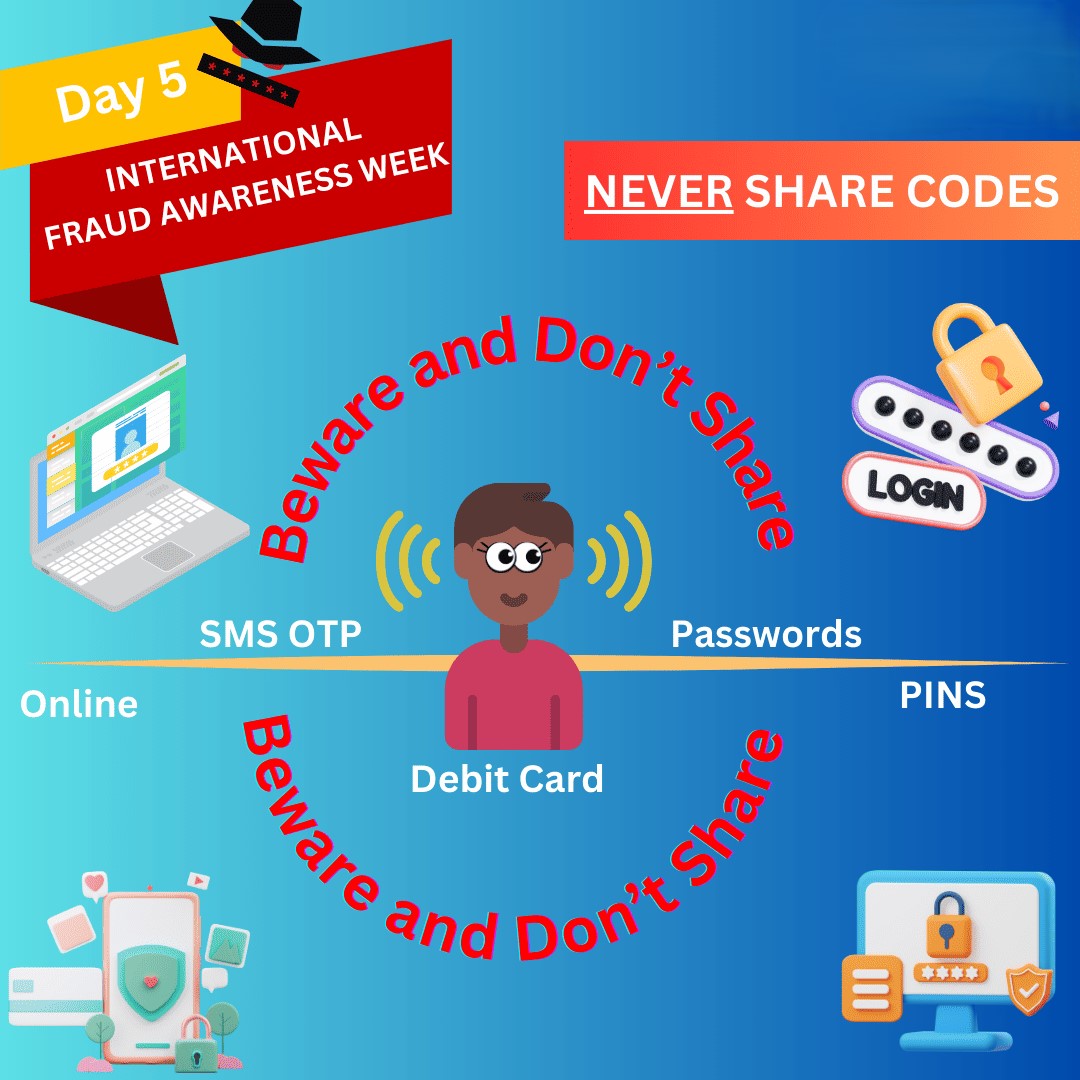Monday’s theme is ‘Fake Websites’.
- Think before you click
- Be wary of links in emails and texts – Go to the website directly or use a search engine
- Use Trusted Websites that display a padlock
- Be wary of sudden promotions that can seem too good to be true
- Fraudsters plan for events such as Black Friday and Christmas
- Contact your bank immediately if you spot a transaction that you don’t recognise
- Use your banking app to freeze your Credit/Debit cards
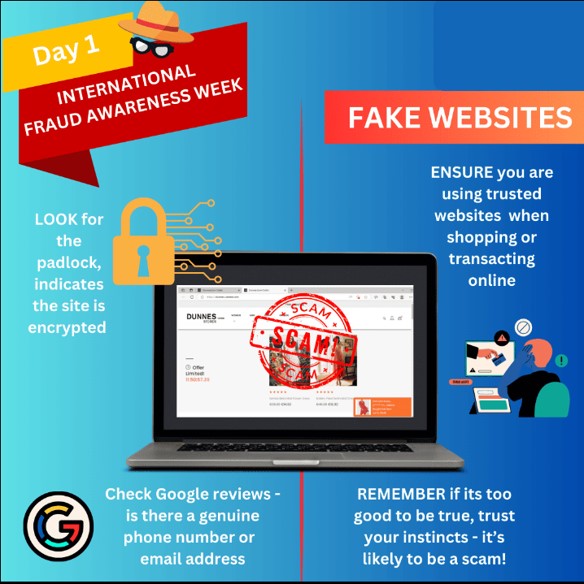
Tuesday Theme is ‘ Dear Mum/Dad Scam
As we observe International Fraud Awareness Week 2024, it’s important to remind ourselves of the tactic’s fraudster use to manipulate trust. One common method or close acquaintance to exploit emotions and tricks individuals into revealing sensitive information or transferring money.
How These Scam Works:
- Urgency and pressure: Fraudsters often claim to be in distress, such as needing urgent financial help for a medical emergency or legal trouble.
- Impersonation: They may use personal details found online to sound convincing, pretending to be loved one in need.
- Secrecy: Scammers might ask you to keep the situation private, to avoid scrutiny.
Tips to Protect Yourself:
- Pause and Verify: Always confirm the identity of the person by calling them directly or contacting another trusted family member.
- Beware of Requests for Money: Be cautions if someone asks for a quick transfer of funds, especially through untraceable methods like gifts cards or wire transfer.
- Keep Information Private: Avoid oversharing personal details on social media, which fraudsters can use to build a convincing story.
If you ever suspect an impersonation scam, report it immediately to .
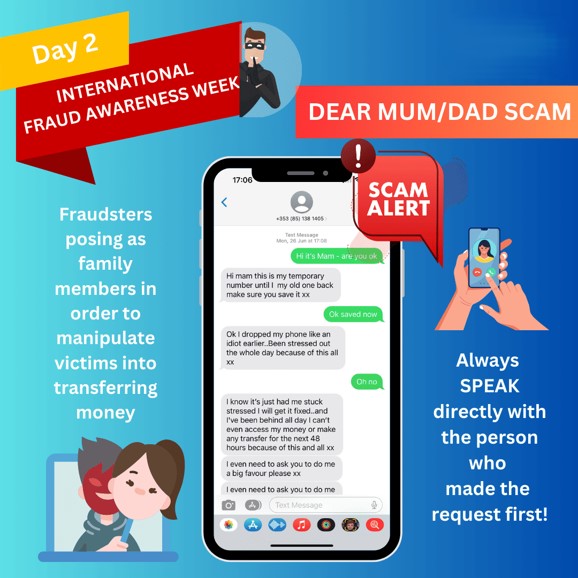
Wednesday’s Theme is – ‘Fake Messages’ pretending to be from your Bank or Credit Union
This is a scam where fraudsters send text messages to random mobile phones – the text messages claim to come from a reputable organisation such as your Credit Union, Bank, or a service provider e.g., a mobile phone company.
A criminal can disguise an email address, display name, phone number, text message, or website URL to convince a target that they are interacting with a known, trusted source.
Criminals use a technique called ‘spoofing’ to make it look like you are being contacted by a trusted organisation e.g., your Credit Union. These scam calls or texts can often appear in genuine message threads making them difficult to spot.
- The message will typically ask you to click on a link to a website or to call a phone number to “verify”, “update” or to “reactivate” your account. The website link leads to a bogus website and the phone number leads to a fraudster pretending to be the legitimate company. The criminal attempts to get you to disclose personal, financial or security information, which will then be used to steal your money.
- These messages often attempt to alarm you, claiming that urgent action is needed, or it will have negative consequences.
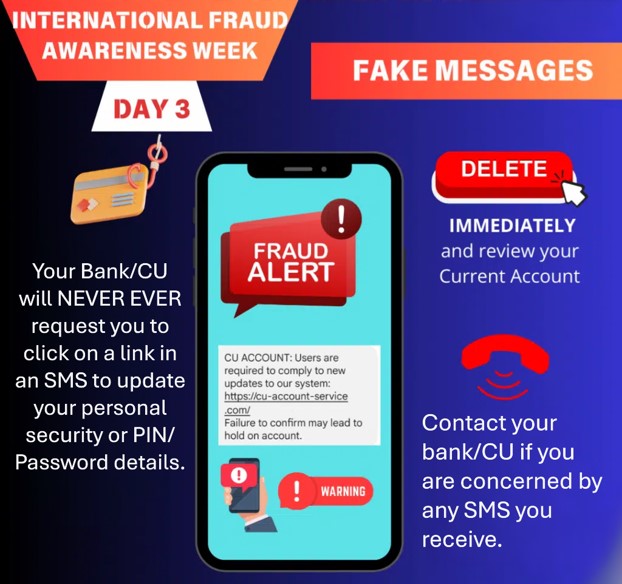
Thursday Theme is – Fake SMS Links
‘Smishing’ is the attempt by fraudsters to trick you into handing over personal information such as your Bank details, usernames, or passwords by clicking on a link they have sent you via SMS or WhatsApp or email.
They pretend to be from a trustworthy source such as your Bank and the information they gain can then be used to access your Current Account or Debit Cards or Online Banking account.
- The criminal typically sends thousands of generic SMS messages to people whose phone numbers have been obtained from an unknown source, in the hope of getting a ‘hit’.
- These SMS Messages tend to have generic greetings such as “Dear Customer” or “Account Holder”.
- In some cases, a tactic called “spear phishing” is used. In these cases, the fraudster has some details about you (frequently sourced through social media) and may use your name or some other specific detail about you in the email.
DON’T EVER respond to messages or urgent payment requests claiming to be from legitimate services like An Post, EFlow, DHL & Amazon. If in doubt, speak directly to the service provider to validate the request before taking any further action.
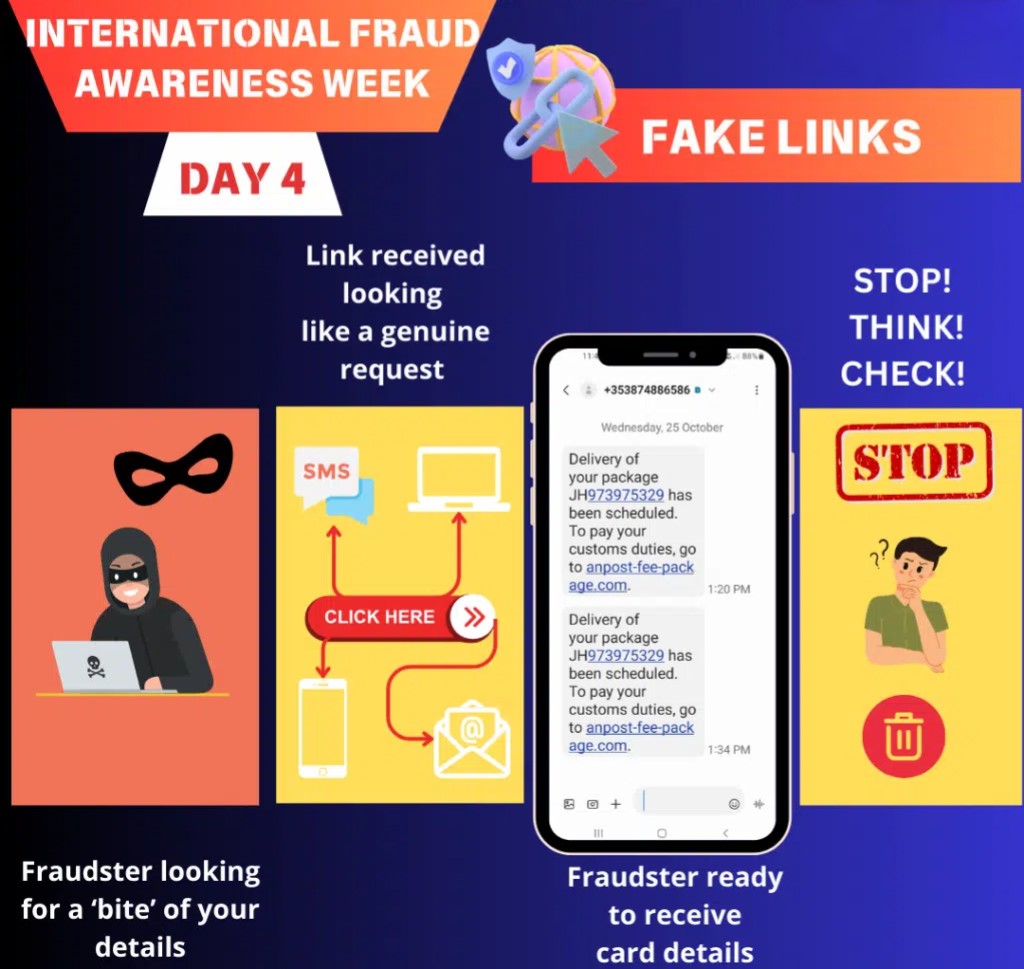
Friday Theme is ‘ Never Share Codes’
As part of international Fraud Awareness Week 2024, we want to highlight as essential tips for staying safe: Never share Verification codes with anyone.
Why This Matters:
Fraudsters often ticks people into sharing one-time passwords(OTPs) or verification codes to gain unauthorized access to personal accounts. These codes are meant to secure them can compromise your data and finances.
Common Scenarios to watch out for:
- Impersonation Scams: A caller or message pretends to be from your bank, a delivery services, or even a colleague, asking for a code to verify your identity.
- Urgency Tactics: Scammers pressure you to act quickly, claiming your account will be locked or a transaction will fail if you don’t share the code.
Tips to stay Protected:
- Keeps Codes Private: Only you should know your verification codes. No legitimate organization will ask for them.
- Pause Before Responding: If you receive a suspicious request, contact the organization directly using official contact details to confirm its legitimacy.
- Be Cautious of Links: Avoid clicking on unfamiliar links in message that request codes or personal information.
If you suspect a scam or accidental code sharing, report it immediately.
